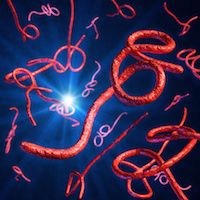Experimental Ebola Drug May Be Effective in Patients in Early Stage of Disease
Favipiravir, an experimental drug to treat the deadly Ebola virus, appeared to help some patients in Guinea with the disease but not others, according to results of the trial released at the 2015 Conference on Retroviruses and Opportunistic Infections held this week in Seattle.

Favipiravir, an experimental drug to treat the deadly Ebola virus, appeared to help some patients with the disease but not others, according to results of a clinical trial released at the 2015 Conference on Retroviruses and Opportunistic Infections held this week in Seattle.
The 2014 Ebola outbreak that hit parts of West Africa is the worst recorded in history. More than 23,000 people were infected and almost 10,000 died from the disease, according to World Health Organization estimates.
The death rate among patients who participated in the trial was higher among those with advance disease and the drug appeared to work better for patients who were more recently infected with Ebola, according to the study abstract.
The phase 2 proof-of-concept trial was conducted in two Ebola treatment centers in Guinea from Dec.17, 2014 through Jan. 20, 2015. The study’s objective was to assess the benefits of a high dose of favipiravir in reducing mortality and decreasing the Ebola virus viral load in patients with the disease.
Study participants were given oral favipiravir, a drug developed by Toyama Chemical Co., a Fujifilm Group company based in Japan. A company news release states that the drug, also known as Avigan, was first developed as anti-influenza medicine and was later shown in mouse studies to have an antiviral effect.
The clinical trial at treatment centers in Guinea began after the drug was administered as an emergency response to several patients who were infected with the Ebola virus. The primary endpoint was mortality and the study compared deaths among trial participants to mortality during the three-month period before it began in the same centers.
For patients with a high or moderate viral load at the beginning of treatment, the rate of mortality dropped from 30% to 15% when compared to treatment results of patients of the same level who received basic care. According to the news release, these early results demonstrate encouraging signs of efficacy.
Preliminary results indicate that the experimental Ebola drug was much less effective in patients who had been sick longer and had very high viral loads. Most had severe kidney failure and died, note the study authors.
Among the 80 patients who received the drug, 69 were adults and adolescents age 14 years or older. Close to half of participants in the study died but the overall mortality rate of 48% was lower than the pretrial mortality rate of 58%, according to the abstract.
The authors conclude that the preliminary data support continued testing of the drug “with particular attention to identifying patients earlier in disease course” and to explore other therapeutic options, including combinations, in patients in advanced disease stages.
In its news release, a Fujifilm Group senior official said his company will continue to “contribute to the termination” of the Ebola virus and plans to fully cooperate with France and Guinea governments, as well as Japanese officials toward establishing treatment for the virus.